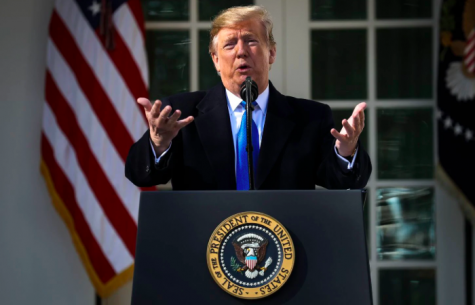Declaration of National Emergency abuses executive powers
February 25, 2019
On Feb. 15, President Donald Trump did two completely different things. First, he signed a bipartisan stopgap spending bill to fund the government and avert another government shutdown. The second action by President Trump was to declare a National Emergency in order to divert funds to build a wall on the southern U.S. border after Congress didn’t give them to him.
There are many problems in regards to this unilateral solution by the White House for a so-called “invasion” at the United States border with Mexico. Since the enactment of the National Emergencies Act in 1976, there have been 56 national emergencies enacted with 32 currently in effect as Congress renews them every year for reasonable justification.
Before President Trump enacted his most recent National Emergency, it had been 18 years since the last State of Emergency was declared in regards to the United States’ armed forces. Before Trump, President George W. Bush declared a State of Emergency after the Sept. 11th terrorist attack. Since Bush was responding to the worst terrorist attacks ever in the U.S. and Trump is talking about that fleeing persecution, it seems that Trump is showing a clear abuse of power.
As well as using sweeping national power to make a political point, declaring a National Emergency in terms of building a border wall directly goes against the basis of Federal Law in the United States. The Posse Comitatus Act, last revised in 2005, states that if someone “except in cases and under circumstances expressly authorized by the Constitution or Act of Congress, willfully uses any part of the Army or the Air Force as a posse comitatus or otherwise to execute the laws shall be fined under this title or imprisoned not more than two years, or both.”
This act means that if President Trump attempted to use military forces to build any portion of a border wall or enforce domestic authority in regards to the Caravans of asylum seekers that he and anyone else involved would face up to two years in federal prison and in the case of the President would face impeachment.
Now there have been exceptions to this statue that has checked the power of the Executive Branch. After Hurricane Katrina in 2005, Congress granted special privileges to the National Emergency President Bush declared. This special provision allowed the military to play a backup role in major public emergencies.
While some may think this gives President Trump the precedent to use the military in such actions but a reversal occurred in 2008 when the Bush administration repealed this law. It was probably for the best as Congress has shown the willingness to assist in real emergencies and not asylum seekers fleeing persecution and death in their home countries.
The pushback against the most recent National Emergency declaration attempt has already begun as 16 states are currently suing the Federal Government for using this National Emergency as a political tool citing not only the Posse Comitatus Act but also the mismanagement of federal funds.

On Feb. 15 2019 President Donald Trump announced a national emergency in a unilateral move to secure funding for a border wall on the southerner border. This move has been blasted politicians in Washington as a broad overstep of executive power.
It seems that when President Trump decided to announce this National Emergency in the same place where Supreme Court nominees are announced that he set the tone for executive power in years to come.






